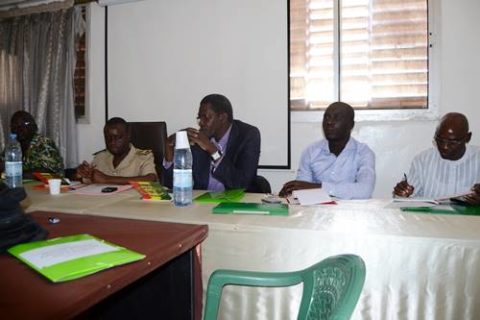Wetlands International and the County Council of Foundiougne have recently set up a Mangrove Platform to harmonize the actions of all partners involved in mangroves protection, preservation and conservation. The plateform will also enable these stakeholders to set up coordinated actions in the management of mangroves areas as well as encourage them to develop strategies to widen them and discuss funding mechanisms for further activities. An action plan to make it happen has been validated and is about to be implemented.
 Wetlands International and the County Council of Foundiougne, just posed an important act in the management of mangrove ecosystem. This was made possible thanks to funding from MFS II Ecosystem Alliance program which has helped to implement the newly established Mangrove Platform. Both structures have worked to get all stakeholders in the Foundiougne county to be associated within a unifying framework in the ecosystem of mangrove. The initiators want to share experiences, explore available opportunities and invite stakeholders to develop strategies for expanding mangrove managed areas and discuss funding mechanisms. But above all, the purpose is to agree on a work plan in the short, medium and long term.
Wetlands International and the County Council of Foundiougne, just posed an important act in the management of mangrove ecosystem. This was made possible thanks to funding from MFS II Ecosystem Alliance program which has helped to implement the newly established Mangrove Platform. Both structures have worked to get all stakeholders in the Foundiougne county to be associated within a unifying framework in the ecosystem of mangrove. The initiators want to share experiences, explore available opportunities and invite stakeholders to develop strategies for expanding mangrove managed areas and discuss funding mechanisms. But above all, the purpose is to agree on a work plan in the short, medium and long term.
The implementation of a short-term action plan has already started. It entails a mapping of actors and intervention. It will set up a database on conservation activities (reforestation, exclosure), and income-generating activities (IGAs).
The creation of this multi-stakeholder platform was timely. As a matter of fact, there were many interventions on the field but all were uncoordinated. The result is a lot of duplication of procedures and efforts, strong pressure on the mangrove particularly in island areas, and a low level of integration as regards the energy wood supply dimension for islanders. Another observation made in the field at the end of the visit that brought together Wetlands International, the County Council and members of the local monitoring committee of the Alliance Ecosystem in 8 areas of Foundiougne is the akward deficit of drinking water in most island villages, the lack of community nurseries in most towns adjacent to the mangrove and the under exploitation of ecosystem services (ecotourism, oyster farming, beekeeping, carbon sequestration – carbon credit) and the coastal erosion which is gaining more and more ground.
”This mangrove platform should be entrusted with a mission of integrated mangrove management” said Papa Mawade Wade, Program Coordinator Wetlands International Africa.
 Mr. Famara Sarr, the second vice president of the county institution, recalled to the importance of the Saloum Delta which he says is one of the most beautiful bays in the world. According to him, it is not only the 6th estuary in the world dubbed a global biosphere reserve, but also a world heritage. Sarr demands that the mangrove platform supports people as he also invites its founders to expand its actions to other structures or institutes such as the IFAN mangrove laboratory that specifically works on the mangrove, or ISRA if not DREEC among others.
Mr. Famara Sarr, the second vice president of the county institution, recalled to the importance of the Saloum Delta which he says is one of the most beautiful bays in the world. According to him, it is not only the 6th estuary in the world dubbed a global biosphere reserve, but also a world heritage. Sarr demands that the mangrove platform supports people as he also invites its founders to expand its actions to other structures or institutes such as the IFAN mangrove laboratory that specifically works on the mangrove, or ISRA if not DREEC among others.
Mr. Alioune Badara Mbengue, the Prefect of the county hailed Wetlands International Africa and the County Council for triggering the creation of this entity which in his opinion, will play a big role in the management of natural resources. He further invites everyone to be an agent in the preservation of the environment.
In addition, the the Friends of Mangrove Journalists’ Association (AAJAM) that Wetlands International has helped to set up, occupies a prominent position in sharing information and raising public awareness for a better management of the mangrove ecosystem and participation in socio-economic development of the natural region of Sine-Saloum. AJAM has benefited a training in Ecosystem Approach and Climate Change Adaptation.
For years and alongside the local communities, Wetlands International has endfeavor to work for reforestation and the restoration of degraded mangrove areas in the Saloum Delta through income-generating activities such as oyster farming, beekeeping and gardening.